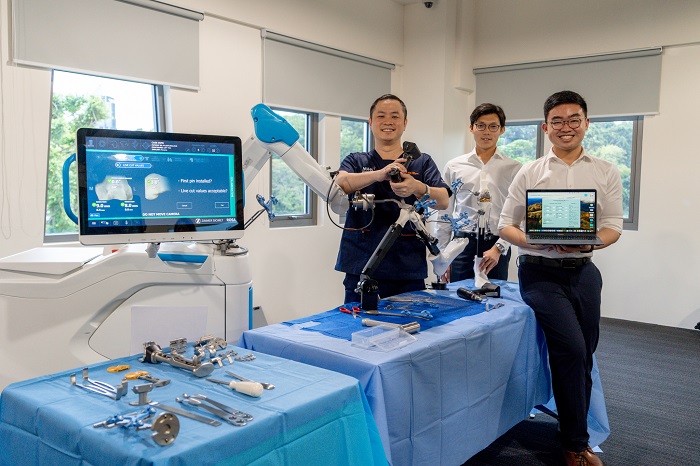SINGAPORE: A team from Alexandra Hospital’s (AH) Orthopaedic Surgery department has secured an international patent for an innovative AI-powered algorithm designed to optimize robotic total knee replacement (rTKR) surgeries. The patent, granted under the Patent Cooperation Treaty (PCT) administered by the World Intellectual Property Organization (WIPO), protects the algorithm’s unique, proprietary rights due to its novelty, exclusivity, and potential to transform knee replacement procedures worldwide.
Filed in over 150 countries since August 2024, the algorithm has undergone rigorous examination by independent patent authorities, with no comparable technologies identified. Singapore’s patent, filed in October 2023, marked the first official step in protecting the invention, which seeks to revolutionize the way surgeons plan and execute rTKRs.
The algorithm was developed by Dr Glen Liau Zi Qiang, an Orthopaedic Surgery Consultant at AH and National University Hospital (NUH), in collaboration with medical students Dr Matthew Ng Song Peng and Mr Ryan Loke Wai Keong. It leverages artificial intelligence to automate and refine the positioning of knee implants, making surgeries more accurate, efficient, and personalized.
Total knee replacement surgeries are essential for patients suffering from severe knee pain, often due to conditions like osteoarthritis. The number of such surgeries has surged over the past two decades, with the rate for those aged 65 and above increasing more than twofold from 187 per 100,000 in 1999 to 499 per 100,000 in 2019.
Robotic-assisted procedures have become increasingly popular due to their precision, but challenges persist. Surgeons must account for each patient’s unique anatomy and the complex task of aligning implants within multiple degrees of freedom, which can lead to time-consuming adjustments and variability in outcomes.
This algorithm aims to streamline this process by considering eight degrees of freedom during implant positioning, automating the identification of optimal placement and dramatically reducing the time required for manual adjustments.
The algorithm is a significant advancement in rTKR, with several key features. It achieves implant positioning accuracy within ±0.5mm, personalized for each patient’s anatomy and the surgeon’s preferred surgical approach. Within 0.1 seconds, the algorithm evaluates thousands of possible implant placements and identifies the optimal solution. By automating the planning process, the algorithm reduces the time spent on intraoperative planning, which in turn shortens the surgery.
Since 2023, over 150 patients have undergone surgery using this new approach, with outcomes showing a significant improvement in the precision of implant placement and a reduction in surgery duration.
Initial clinical data suggests that this AI-driven solution improves surgical accuracy and enhances operational efficiency. In a prospective study involving 67 patients between 2021 and 2023, 92% of surgeries using the algorithm achieved implant positioning within ±1.5mm of the surgeon’s target, compared to just 52% in the manual planning group. Additionally, the algorithm reduced planning time from 15 minutes to under 0.1 seconds, cutting the overall surgical time by approximately 48%.
The long-term benefits could include fewer complications such as implant loosening, wear, and instability, leading to reduced revision surgeries and better long-term outcomes for patients. The algorithm also has the potential to reduce blood loss, infection rates, and anaesthesia time, all of which contribute to improved patient safety and faster recovery.
The innovative nature of this algorithm has garnered attention in the medical community. It was awarded the prestigious P. Balasubramaniam Award for best research paper at the 2024 Singapore Orthopaedic Association Annual Scientific Meeting. Additionally, it has been selected for presentation at the 2024 International Society for Technology in Arthroplasty (ISTA) Scientific Congress in the United States and the 2025 International Society of Arthroscopy, Knee Surgery, and Orthopaedic Sports Medicine (ISAKOS) Congress in Germany.
Dr Liau, the lead developer of the algorithm, expressed his excitement about the potential impact of the technology. He said, “I am passionate about incorporating innovative solutions to enhance my patient outcomes. It brings me great joy and satisfaction to see my patients enjoy a significantly improved quality of life following surgery.”
With ongoing studies to evaluate its long-term effects, this AI-driven algorithm stands poised to set new standards in robotic-assisted orthopaedic surgery, ultimately benefiting patients and surgeons around the globe.

